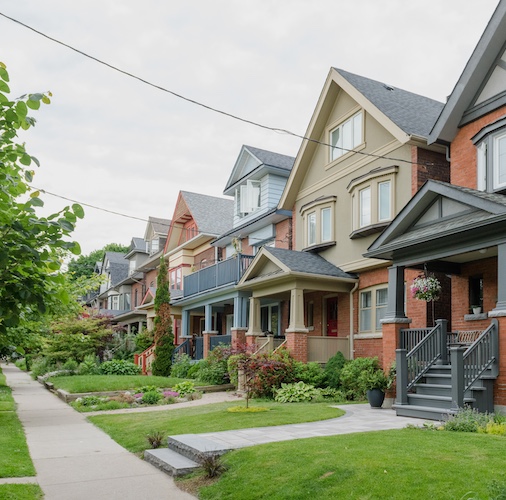Different types of mortgages and how they work
Contributed by Sarah Henseler
Dec 8, 2025
•8-minute read

Just as there are lots of different types of homes, there are many different types of mortgages, each with unique features, pros, and cons. If you’re in the market to buy a home or just want to know more about borrowing money to buy one, it helps to understand the different types of home loans you can choose from.
What to consider before choosing a mortgage
A mortgage is a loan you use to buy a home. Like any loan, lenders will examine your finances before approving you for a mortgage.
There are many types of mortgages, each with its own requirements borrowers must meet. When choosing a mortgage, you’ll want to start by considering whether you can meet these basic requirements:
- Down payment. The size of your down payment can affect the mortgage rate lenders offer you and which loan type you can qualify for.
- Monthly mortgage payment. Mortgage lenders will look at your income and assets to determine the total loan amount you can afford to pay back. When calculating your budget for your monthly mortgage payment, consider the principal amount, interest and taxes, mortgage insurance, utilities, and any homeowners association fees.
- Credit score: Your credit score will play a large role in determining the interest rate on your loan and the program you qualify for.
Types of mortgages, at a glance
There are a number of different types of mortgages out there, each with pros and cons. For example, some are aimed at people with a lower credit score, but they may be more expensive. Others are designed for people with a higher credit score, letting them offer benefits like a lower down payment.
|
Mortgage type |
Best for |
Credit score |
Down payment |
Backed by |
|
Home buyers with good credit who can make a substantial down payment. |
N/A |
3% or higher |
Private mortgage lenders and investors |
|
| Home buyers with good credit who can make a substantial down payment. |
N/A |
5% or higher |
Private mortgage lenders and investors |
|
|
Home buyers with limited credit or first-time home buyers |
500 or higher |
3.5% with 580 or better credit score2; 10% with credit scores of 500 – 579 |
Federal Housing Administration |
|
|
U.S military service members, veterans, and their spouses |
N/A |
0%, down payment optional |
Veterans Affairs |
|
|
Home buyers who are purchasing in rural areas |
N/A |
0%, down payment optional |
U.S. Department of Agriculture |
|
|
Home buyers who want to buy property that is higher than the conforming loan limits |
680 or higher |
10% or higher |
Private mortgage lenders and investors |
*At this time, Rocket Mortgage® doesn't offer USDA loans.
Conforming and nonconforming loans
Mortgages are either conforming or nonconforming. Conforming loans can be sold to one of two government-sponsored enterprises: Fannie Mae and Freddie Mac.
Conforming loans
A conforming mortgage is one that meets the requirements set by the Federal Housing Finance Agency (FHFA). For example, conforming loans have a debt-to-income ratio guidelines, maximum loan amount, and minimum down payment percentage.
Conforming loans are widely available. Because they conform to FHFA standards, they can be easily sold on the open market, which makes them less risky for lenders. That results in conforming loans usually having lower interest rates than nonconforming loans.
Superconforming loans are a type of conforming loans that exceed typical loan maximums. They are only available in designated high-cost areas.
A similar concept is a jumbo loan, which is a type of nonconforming loan that exceeds the maximum loan amount but is offered for a home in a non-high-cost area or one that exceeds the higher loan maximum for high-cost areas.
Nonconforming loans
Nonconforming loans are those that don’t meet the requirements set by Fannie and Freddie. For example, they may be offered to borrowers who don’t meet typical credit score requirements, have a recent bankruptcy, or need to borrow large amounts of money.
Other nonconforming loans are offered through special government-backed programs, such as FHA loans, VA loans, or USDA loans.
Some, but not all, nonconforming loans are more expensive than conforming loans because of their perceived higher risk and the fact that they’re harder for lenders to sell on the open market.
Conventional mortgages
A conventional mortgage is what most people think of when they think of mortgages. Any loan that isn’t part of a specific government program is a type of conventional mortgage.
These loans are suitable for most people who have strong credit and a large down payment. Conventional loans also enable the purchase of vacation homes and investment properties.
If you cannot make a down payment of at least 20%, you’ll usually have to pay for private mortgage insurance (PMI). This is an additional monthly payment added to your loan that will drive up the overall cost of your home.
Fixed-rate mortgages
A fixed-rate mortgage is one that has an interest rate that is set at the time you get the loan. That means that the rate won’t change over the life of your loan. It also means that the principal and interest portion of your mortgage payment won’t change.
To get this type of loan, you’ll need:
- While there's no minimum score, you'll have an easier time qualifying with strong credit
- A down payment of at least 3%
- A debt-to-income ratio typically under 45%
Pros
Some benefits of conventional, fixed-rate loans include:
- Widely available: Almost every mortgage lender offers this type of loan.
- Payments won’t change: The principal and interest portion of your loan payment is set, so you won’t have to pay more if rates go up.
Cons
There are also drawbacks to fixed-rate loans.
- Higher initial rates: Fixed-rate loans usually have a higher rate than adjustable-rate mortgages have during their intro period.
- You may lock in a high rate: If you get your mortgage when rates are high, you may lock yourself into a loan with a high rate. You’ll have to refinance, paying any applicable fees, to reduce the loan’s rate.
Adjustable-rate mortgages
Adjustable-rate mortgages (ARMs) have an interest rate that can change over time. Usually, ARMs are described using numbers such as 5/1 or 7/1. These numbers stand for the initial rate lock period and the adjustment period of the loan.
For example, with a 5/1 ARM, the initial rate of the loan is set for 1 year and adjusts once per year after that. When the time to adjust the rate comes, the loan will have a new rate set based on the details in your mortgage contract, with the rate usually being based on a benchmark rate plus or minus a set amount.
To get this type of loan, you’ll need:
- Again, there's no minimum, but lenders may have their own policies.
- A down payment of at least 5%
- A debt-to-income ratio typically under 45%
Pros
There are some advantages of getting an adjustable-rate mortgage.
- Lower initial mortgage rate: ARMs usually have lower rates than fixed-rate mortgages, at least at first.
- Refinance to a fixed rate at a later date: If rates rise, you can always refinance to a fixed-rate loan at a later time.
Cons
Before going for an ARM, make sure you consider the drawbacks.
- Unpredictable payments: With an ARM, the interest rate of your mortgage can rise over time, which will make your payment increase, potentially to the point of being unaffordable.
- Loans have minimum rates: Usually, ARMs have a minimum interest rate written into the contract. Even if rates drop, you may not get the benefit of the decrease if your loan has a minimum rate.
Government-backed loans
The government offers a number of special programs designed to help people become homeowners. Government-backed loans can be available to anyone or designed for specific groups of people.
Government entities offer insurance for these types of loans, which reduces the risk lenders take on by offering them. That means that government loans are usually easier to qualify for and may have lower overall costs. If you’re a veteran, or buying in a rural area, or don’t have great credit or a large down payment, these loans may be a good fit.
FHA loans
An FHA loan is a mortgage insured by the Federal Housing Administration. These loans are designed to help make homeownership more affordable by offering lower down payments and credit score requirements.
You can apply for an FHA loan with many different lenders, so look for options in your area and take the time to comparison shop.
To qualify for an FHA loan, you’ll need:
- A down payment of 3.5% or more
- A credit score of 500 or higher (scores below 580 must have a down payment of 10%)
- To occupy the home you buy as a primary residence
- Borrow less than your area’s loan limit: $541,287 in most areas.
USDA loans
USDA mortgages are loans designed to help people who want to purchase a home in designated rural areas. You a view a list of eligible rural areas on the USDA’s website. Loans are offered through the USDA’s network of approved lenders.
These loans have no credit score requirement, but you must be able to show that you’ll be able to manage the debt.
You must meet these requirements to get a USDA loan:
- Be a U.S. citizen, U.S. non-citizen national, or Qualified Alien
- Occupy the home as a primary residence
- Make 115% or less of the area’s median income
Rocket Mortgage doesn't offer USDA loans.
VA loans
VA loans are backed by Veterans Affairs and are available to members of the military and veterans. They offer a number of valuable perks, including having no down payment requirement or PMI payments. Often, loan rates are lower than rates for other types of loans, though this is not always true.
To qualify, you must meet these requirements:
- Meet specific minimum active-duty requirements.
- For active service members, you’re eligible after 90 continuous days of service.
- Service requirements vary for National Guard members, Reserve members, and veterans based on time and type of service.
- Surviving spouses may also be eligible if they receive VA Dependency or Indemnity Compensation or are the spouse of an MIA or POW service member.
- Meet the credit score minimum set by your lender
Pros of government-backed loans
If you can qualify for a government-backed loan, there are a number of perks to consider.
- Easier underwriting: Most government loan programs have lower credit score requirements.
- Low or no down payment: Depending on the loan type, you may have to make a smaller down payment or no down payment at all.
- Closing cost assistance: Some government loan programs can give you assistance with closing costs.
Cons of government-backed loans
Government-backed loans aren’t right for everyone, so consider these drawbacks.
- Eligibility requirements: Not everyone is eligible for these types of loans. For example, people who aren’t veterans or who don’t want to buy a rural home aren’t eligible for VA loans or USDA loans, respectively.
- Potentially higher costs: Special appraisal requirements, pest inspections that may be required, and the VA funding fee mean that there is the potential for closing costs to be significant. This may be offset by not needing a down payment.
Jumbo loans
A jumbo loan is a type of nonconforming mortgage that is for a large amount, exceeding the limits set by Fannie Mae and Freddie Mac.
Borrowers usually need to meet stricter credit and financial requirements to qualify.
If you’re looking to buy a pricey home, keep in mind that Rocket Mortgage does offer jumbo mortgages.
The bottom line: Take your time to find the best mortgage for you
There’s a wide variety of types of mortgages out there, from conventional loans anyone could apply for to specialized government programs aimed at veterans.
If you’re in the market to buy a home, take the time to consider a few different types of mortgages to see which is the best for your situation. If you want to look into your options, you can start by applying online.
1Rocket Mortgage is not acting on behalf of FHA or HUD.
2To qualify for this offer, you must meet all standard FHA eligibility requirements. In addition, your total mortgage payment, including taxes and insurance, cannot exceed 38% of your income, your debt-to-income (DTI) ratio cannot exceed 45%, and you must have 12 months of verifiable housing history immediately prior to your application, no late payments 30 days or greater in the last 12-months, and no derogatory marks on your credit report. Not available on jumbo loans. Asset statements may be needed, no more than 1 day of non-sufficient fund fees are allowed in the most recent 2 months prior to application. Additional restrictions/conditions may apply.
3Rocket Mortgage is a VA-approved lender, not endorsed or sponsored by the Dept. of Veterans Affairs or any government agency.

TJ Porter
TJ Porter has ten years of experience as a personal finance writer covering investing, banking, credit, and more.
TJ's interest in personal finance began as he looked for ways to stretch his own dollars through deals or reward points. In all of his writing, TJ aims to provide easy to understand and actionable content that can help readers make financial choices that work for them.
When he's not writing about finance, TJ enjoys games (of the video and board variety), cooking and reading.
Related resources

10-minute read
14 questions to ask a mortgage lender
The best way to pinpoint the right mortgage lender for you is to ask plenty of questions. Read through these 14 essential ones to get you started.
Read more

5-minute read
How much money do you need to buy a house?
Ready to buy a home? Explore different home buying costs, such as the down payment and closing fees, to determine how much money you need to buy a house.
Read more

10-minute read
Closing Disclosure: What it is and how to read the form
Your Closing Disclosure is an important mortgage document, but it can be difficult to interpret. We broke down the essential components in this complete guid...
Read more